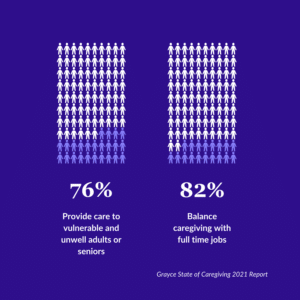Employees may tell you about vacation plans or an upcoming move, but they may be too afraid to discuss another part of life outside the office — their caregiving responsibilities at home. In fact, nearly half of workers who are caring for loved ones aren’t talking about it with their employers for fear it will negatively impact how they are perceived.
And 1 in 5 employee caregivers say they don’t talk about the responsibilities and stress because they don’t believe their employers care.
By offering support for employee caregivers as a benefit, HR can play an active role in normalizing what is a fundamental human experience: caring for loved ones. It weaves directly into other benefits you may already offer, like health insurance, Family and Medical Leave and retirement, while improving initiatives like employee mental health and Diversity, Equity and Inclusion.
So let’s explore what caregiving can be, and how solutions for caregivers can help almost everyone on your team.
How is caregiving defined and who on my team is doing it?
Caregiving is an umbrella term that includes emotional, legal, financial, functional, medical, social or any combination of responsibilities outside of parenting. The relationship from caregiver to person they are caring for can be broad — parents, siblings, unwell children, close friends, neighbors — every situation can be different.
Balancing work and caregiving is more common than you may think. Among people surveyed for our latest State of Caregiving Report, 76% of those surveyed said that they provide care to vulnerable and unwell adults or seniors. 82% surveyed balance caregiving with a full-time job.

See our State of Caregiving 2021 Report in full here
Caregiving is so much more than providing hands-on care. Responsibilities like scheduling medical appointments, planning transportation, and navigating the healthcare system, financial institutions and government programs can be major factors and stressors for caregivers. While the majority of caregivers reported relationship-oriented and emotional concerns as primary stressors, time, intensity and confusion about what to do next are second and third on the list.
Employers may not be able to solve for the emotional impacts of an ailing family member, but it’s crucial that they provide a caregiving empowerment solution to improve employees’ lives. A 2021 Federal Reserve study showed that caregiving for an adult is the second highest reason people leave the workforce — just behind early retirement.
Both caregiving and non-caregiving employees in our study want employers to better support caregivers and are more engaged at work with employers that do. In fact, 82% agreed or strongly agreed that if their employer offered more caregiving support, they would feel the company cares about their well-being.
So finding caregiving solutions that can help support your employees is good for your people, your business, your employer brand and the kind of culture people talk about on Glassdoor and LinkedIn. Benefits like Grayce resonate when people are talking about what their experience at your organization was like.
When care for family members affects employee mental health
The case for employee mental health as an HR priority is an established one. Positive mental health can translate to a more productive, resilient and happier workforce. Studies show caregiving, however, is an extra barrier to a healthy mental state.
Kaiser and Blue Cross studies show family caregivers experience mental health problems more often than those who are not involved in helping a loved one. Caregivers are also at a higher risk of developing conditions like addiction and severe depression.
In our national survey, 79% of working caregivers reported being stressed and 74% of those said stress starts even earlier than anticipated, while their loved ones are still independent. Adding that stress onto full-time work can negatively affect a person’s mental health.
Care for family members is a root cause of stress. As caregivers begin to take on the details and duties of someone else’s life their energy is sapped and their decision-making capabilities diminished inside and outside of work. It involves navigating systems that may not be designed for a loved one’s success and evaluating options with multiple variables and no clear winners. Caregiving solutions that connect your employees one-on-one with care professionals who are experienced at untangling the ins-and-outs of these complex systems can be a great benefit.
Supporting employee caregivers is part of any true DEI initiative
Since 2020, employers have shown a renewed commitment to Diversity, Equity and Inclusion programs. All of these efforts to hire and support employees of color, however, must take into account the unique pressures they face outside of the workplace. For employees of color, the stressors of caregiving can compound.
According to a 2020 AARP report:
- 45% of white caregivers rate their health as excellent, compared with
- 35% of Hispanic caregivers and
- 34% of African American caregivers
A Family Caregiver Alliance report shows that 33% of African American and Hispanic caregivers spend more time caregiving than their white counterparts. The disparity between caregiving responsibilities — and their effect on employee health — can involve many factors, but the takeaway is that any support an employer offers will have an outsized impact on staff who identify as Black or Latino.
A full-service caregiving solution, then, is a necessary part of any DEI initiative aimed at keeping employees of color healthy and engaged in the workplace and in preventing poor health outcomes in general.
Supporting employees with caregiving responsibilities goes beyond FMLA and EAPs
Caregiving demands a lot, from a lot of different people at your company. An ideal caregiver solution will be both personalized to each specific user and have a depth of expertise to fit the innumerable permutations of each caregiver’s needs. Most importantly, it will give your employees an advocate who can help them navigate a challenging, stressful time, so they can focus on their own well-being.
Research reports like the State of Caregiving directly inform the service Grayce offers: a completely personalized experience with one-on-one emotional and logistical support from a veteran care professional. Grayce is a global caregiving solution with the ability to offer resources and community around any situation from parents with kids – including those with neurodiverse needs to eldercare.
If a caregiving solution sounds like the next benefit you want to offer your employees, let’s talk about how Grayce and our global caregiver empowerment solution can help.

